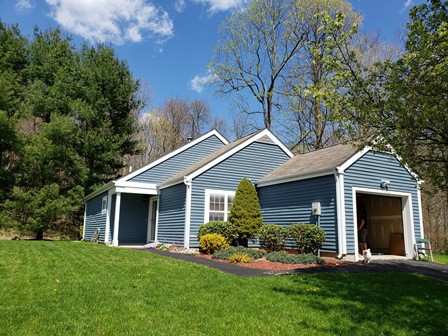
affordable housing program
By Dan Murphy
It has been more than 20 years since the Town of Yorktown has offered a private home up for sale as : A two-bedroom single family home in Yorktown for $121,000. No, not wishful thinking. A reality.
Applications are being accepted for a lottery for the purchase of a two-bedroom, 1,100 square foot single family house in Yorktown Heights. Built in 1995 as part of Yorktown’s pioneering Affordable Housing Program, the house includes a living room with dining area, kitchen, one bathroom, deck, and an attached one car garage.
Amenities include membership in a homeowner’s association that maintains a swimming pool and tennis courts.
Under the Program’s 2020 guidelines, to be eligible for a two bedroom house, the maximum household income cannot exceed $80,560 for a two person household, $90,640 for a three-person household, and $100,640 for a four-person household. The maximum household size for a two-bedroom house is four persons.
For 2019, the combined town, county, and Lakeland School District taxes were $5,590. Homeowner’s association fees are currently $125/mo.
The house is located about seven (7) minutes from the Taconic Parkway and is approximately a 10 minute drive to local shopping and other services in the Yorktown Heights business hamlet.
Qualifying applicants will need to be able to make a down payment and obtain a mortgage. The house must be purchased as a primary residence and lease and resale restrictions apply.
According to Ken Belfer, Chair of the Yorktown Community Housing Board, “It has been almost 20 years since Yorktown sold a home through its small affordable housing program. This represents a wonderful opportunity for someone to own a very affordable home in an attractive neighborhood. Applications not selected for this home will remain on Yorktown’s affordable housing waiting list for the next opportunity.”
Applications for the two bedroom house can be downloaded from the Town of Yorktown’s web site, www.yorktowny.org, or by contacting the Town Clerk’s office, Yorktown Town Hall, 363 Underhill Avenue, Yorktown Heights, NY 10598, (914) 962-5722, ext. 209, email townclerk@yorktownny.org.
Completed applications must be returned no later than August 14, 2020. One of the earliest efforts by a northern Westchester town to address the growing need for more affordably priced housing, between 1988 and 1995 the Yorktown Affordable Housing Program created 13 affordably priced single family homes.
In a related story on affordable housing, U.S. Department of Housing and Urban Development (HUD) Secretary Ben Carson recently announced the Department will ultimately terminate the Obama Administration’s Affirmatively Furthering Fair Housing (AFFH) regulation issued in 2015, which proved to be complicated, costly, and ineffective— so much so that Secretary Carson essentially removed its burden on communities by suspending the regulation’s 92 question grading tool in January 2018.
“After reviewing thousands of comments on the proposed changes to the Affirmatively Furthering Fair Housing (AFFH) regulation, we found it to be unworkable and ultimately a waste of time for localities to comply with, too often resulting in funds being steered away from communities that need them most,” said Secretary Carson. “Instead, the Trump Administration has established programs like Opportunity Zones that are driving billions of dollars of capital into underserved communities where affordable housing exists, but opportunity does not. Programs like this shift the burden away from communities so they are not forced to comply with complicated regulations that require hundreds of pages of reporting and instead allow communities to focus more of their time working with Opportunity Zone partners to revitalize their communities so upward mobility, improved housing, and homeownership is within reach for more people. Washington has no business dictating what is best to meet your local community’s unique needs.”
This brand-new rule, called Preserving Community and Neighborhood Choice, defines fair housing broadly to mean housing that, among other attributes, is affordable, safe, decent, free of unlawful discrimination, and accessible under civil rights laws. It then defines “affirmatively furthering fair housing” to mean any action rationally related to promoting any of the above attributes of fair housing.
Now, a grantee’s certification that it has affirmatively furthered fair housing would be deemed sufficient if it proposes to take any action above what is required by statute related to promoting any of the attributes of fair housing. HUD remains able to terminate funding if it discovers, after investigation made pursuant to complaint or by its own volition, that a jurisdiction has not adhered to its commitment to AFFH.
Persons who believe they have experienced housing discrimination may file a complaint of discrimination by contacting HUD’s Office of Fair Housing and Equal Opportunity at (800) 669-9777 or visiting How to File a Complaint on HUD’s website. Materials and assistance are available for persons with limited English proficiency. Individuals who are deaf or hard of hearing may contact the Department using the Federal Relay Service at (800) 877-8339.





